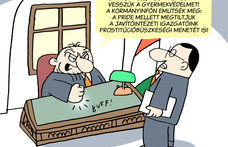The poor turnout suggests that Orban's circle were right to keep a formal distance from the militant figures on the street, many of whom were once Csurka's footsoldiers. The caution is justified, since the demonstrations were timed for the fourth anniversary of the "bridge blockade" of four years ago. Most of us will remember that "direct action" that brought gridlock to the city for a few hours as protestors demanded a recount - and which backfired on Fidesz. It is no surprise, therefore, that this year the leaders of the once again defeated Right should have refrained from shouting about electoral fraud or calling for illegal street demonstrations.
There is another reason for caution: Hungarians are not natural demonstrators. We were always better at passive resistance than at waving banners in crowds. The total number of attendants at all the party rallies put together is less than the number of people who are at home quietly watching television. Only a few hundred people gathered before parliament. This is true not just in terms of party politics. Trade unions are just as incapable of mobilising more than a few thousand people. In Hungary, demonstrations do not bring governments down. So it is not in the interests of any politician to openly support a performance of this nature.
Further, Fidesz is rightly worried about the uncontrolled reactions of its incestuous subculture. If the activists' "military wing" becomes the focus of a live demonstration, then all kinds of problems arise. There are always a few people wearing ancient Hungarian dress or bomber jackets, carrying King Arpad's flag, and they are generally regarded as ridiculous, pitiful, or alarming, fit only to win 15 seconds of fame with some choice anti-semitic or anti-Roma slogan. It was such people who dominated the protest on Kossuth ter. Of course, this could be avoided if the demonstration had been run by professional organisers from Fidesz headquarters. But there is not enough money: the elections emptied the party coffers. Any money left over has to be saved for the local elections. So it is up to the volunteers. And this could bring fresh anxiety to the world.
Up until now, every election has confirmed losing parties in the view that they have to brace themselves for just one more heave, and then they will be back in power. But the 2006 elections broke this pattern. Fidesz has to prepare itself for long years in the wilderness. Orban's response has been to make a clean sweep in the party ranks. He has demoted, dispersed or kicked upstairs the old guard. Faceless youths, non-party figures or faithful clients have taken their place. The party's candidate for mayor of Budapest or the parliamentary party leader are good examples of this. This could lead to dissatisfaction in the Fidesz ranks. Thus, Orban and his circle are desperate to be legitimised from outside.
Among the rearguards who have taken to the streets, the leader cult has grown to deep Balkan levels. These are the people who believe the president of Fidesz to be "the greatest European politician of the 20th and 21st centuries," even though he has lost three out of four parliamentary elections, if we exclude the elections of 1990. This is not enough for a party. There is no way the party president can maintain the status quo without at least some results. If he falls flat on his face in the approaching local elections as well, then the party elite may well rise up in anger. And then Orban will have nothing to lean on other than the irrational adoration of some of his fans.
Unfortunately for him, it is not possible to win an election using the defeated dregs of the Civic Circles, anti-semitic and homophobic barrow boys, Christian fundamentalists and hobbiest provocateurs high on adrenaline and drugs. Orban's only hope, therefore, is to build up dissatisfaction at unavoidable government spending facts into a critical mass of protest, hitting the local elections on a wave of populist anger.
Polls give him reason for optimism. Except for the fact that, however unpopular a government, it cannot be brought down by local elections. And, over the past few years, local authorities have become increasingly dependent on the central budget. They receive targeted subsidies, and development money is allocated according to political criteria. The ruling coalition is shamelessly threatening people with such metacommunicative gestures. Indeed, the coalition sometimes openly states that districts that vote the wrong way cannot rely on receiving money to repair roads and sewers.
Gyuarcsany is attacking Orban with his own weapon of choice: the confrontational politics of blackmail. As things stand, Budapest will remain in the hands of the governments, and a Fidesz victory is unlikely even in the larger cities and in the counties. Most small towns are lead by independent councils. The most likely script is that Orban hangs on to the traditional right-wing district authorities. He might make some small advances: here a new Fidsez mayor, there a slight swing towards Fidesz on the council, a county reconquered. But will this be enough to get rid of all those wounded interests within the party? Especially if Fidesz MPs and local councillors start getting nervous about Kubatov's crowd of post-Csurkist street demonstrators. Because, unlike the enthusiastic amateurs, the MPs actually have something to lose.
Tamas Laszlo Papp














